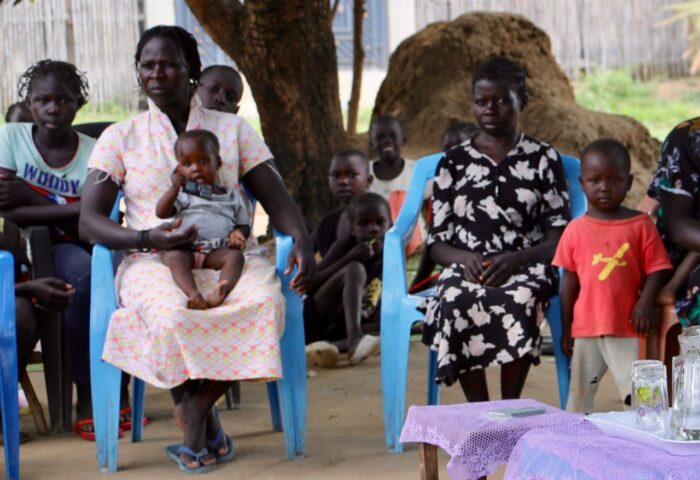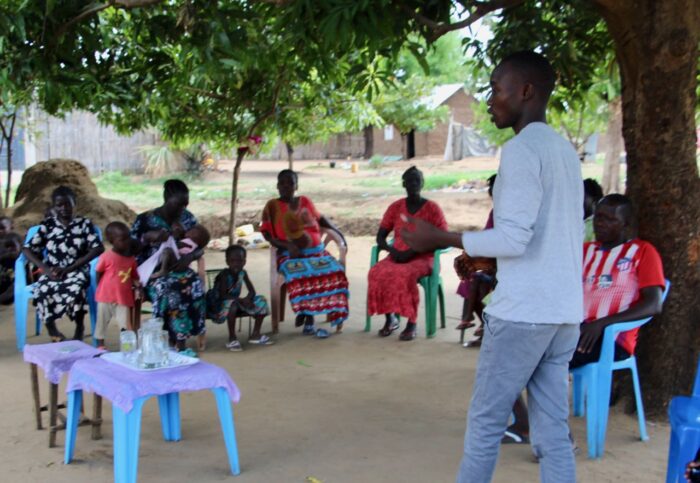Keeping education on the agenda during school closures
May 6, 2021 12:02 pmIt’s over a year since schools closed across South Sudan due to COVID-19. Learning for many children came to a standstill until the Ministry of General Education and Instruction (MoGEI), together with education partners, introduced distance learning through radio.
However, not all learners have been able to access these distance learning solutions. South Sudan’s media landscape is limited by poverty, access to electricity and poor infrastructure. Radio is the most widely accessed media source in South Sudan, as well as the most developed. Our research (2018) shows that, even though radio is the most prevalent form of media in the country, only 57% of the population have access to it.
GESS’ Community Mobilisation activities aim to reach remote communities who do not have access to radios or radio coverage with listening clubs – safe spaces to listen to Our School radio programme and to discuss the education-related topics covered in the radio programme.

Family listening group in Central Equatoria State
School community listening clubs stopped at the beginning of the pandemic to comply with the Government of the Republic of South Sudan’s ban on social gatherings. Community listening clubs were one of the activities of the Behaviour Change Communication element of the GESS programme to create an enabling social-cultural environment for supporting girls’ education in South Sudan.
When community listening clubs ended, family listening groups were born! Family listening groups allow family members to sit together in a safe environment to listen to the pre-recorded radio programmes through a solar-powered, wind-up radio handset delivered to them by the Programme. Each family has access to the radios for one week, allowing members to listen in their own time and to partake in discussions around the topics they have listened to.
Wesley Elzai, a father of four in Munuki Payam, Juba, said, “Without the this listening group I wouldn’t have known that a child can start school as early as five years. I was thinking that a child should wait until he or she is seven years before they can start primary school. Now when schools reopen, I will send my child to school”.
The family listening groups are monitored by GESS Community Mobilisation Volunteers (CMVs) who are members of the communities that they operate in. The CMVs deliver the handsets and identify an individual within the family to be responsible for the it and instruct them on how to operate it. From time to time, they will visit to see the progress.
Isaac Mubarak, CMV for Munuki Payam, Juba County of Central Equatoria State, said, “You know that the listening groups are helpful because peoples’ attitudes continue to change positively towards education, even when schools are closed. When you come to take the handset away, the family head is always thankful and expresses gratitude. When you interact with the children, you know that they have been listening to the programmes and have learnt something. That’s what makes me happy”.

Isaac Mubarak, CMV for Munuki Payam
Sabata Alphonse, a mother of six, explained how Our School helped her to encourage her children throughout school closures: “I am not educated and when schools were closed, I struggled to help my children to study or even have discussions with them about school. I didn’t know what to tell them. But now (after listening to Our School), I know that they can learn on their own with those in upper classes and they can stay active even while at home. All I have to do is give them time and encourage them to keep reading’’.
Mary, a mother of three, added, “I have learnt that if you want your children to learn, you have to make an effort. The teachers make an effort to get them to understand, so, while I listened to the programme about ‘children continuing to learn while on holidays’, I realised that as a parent, I should make an effort too”.
With the school closures, learning became difficult for many as some parents are not educated and are not in position to support their children to continue learning. With such listening groups, conversations around school related matters are sparked between parents/guardians and children, helping them to cope with the reality of school closures.
With the school closures due to COVID-19, GESS reprogrammed to ensure education remains on the agenda in communities and families.
To learn more about GESS’ Community Mobilisation activities, go here.
The GESS programme receives £70 million (GBP) of UK aid from the UK Government and $19.2 million (CAD) from the Government of Canada through Global Affairs Canada. The GESS programme is led in collaboration between the Ministry of General Education and Instruction (MoGEI), the UK Government and the Government of Canada and implemented in a consortium led by Cambridge Education/Mott MacDonald, including BBC Media Action, Montrose, Leonard Cheshire and Windle Trust International.
Tags: Behaviour Change, Build back better, Development, education, EducationCannotWait, FCDO, GESS, girls' education, Global Affairs Canada
Categorised in: Girls' Education, Social & Behavioural Change Communication